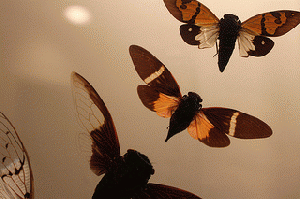"Conversation with a Cicada"
Lou Miller and Les Adler
It's taken weeks and the urgings of
friends, but I've decided to come out. I'd
feared doing so would place me in the same class of people as Clint Eastwood
whose rant to a wooden stool spoiled it for anyone who communicated with
something not quite human.
Even though I was warned I could
become tagged as the "Cicada Whisperer," the incredible conversation I recently
had with a spokesman from that much-maligned species forces me to speak out.
Not long ago, my garden was a
tranquil area where I could enjoy a cup of coffee while busy on my laptop--or
play baseball and soccer with the kids.
That suddenly changed when the soil temperature reached sixty-four
degrees and the magicicadas (a taxonomical term) knew the time was ripe for
them to emerge from seventeen years of living underground.
Cicadas taking flight by DanCentury
They took over the neighborhood with
their noisy and overt sexual behavior.
They were members of Brood II--one of the largest in the country--who
populate the East Coast of the United States.
What's unusual about these cicadas is
they spend seventeen years of their lives underground feeding on the roots of
our trees. On cue, they emerge to mate
and lay eggs that drop back down in the soil and bury themselves for another seventeen
years.
One of these cicadas had been
assigned by the brood to talk with me to find out what conditions would be the
next time they were scheduled to emerge.
He hopped on the lip of my coffee cup and started the conversation.
"Seems like the ground temperatures
have been getting just a tad bit warmer over the past few generations," he casually
offered. "Can we expect that trend to
continue?"
"Excuse me?" I responded, lifting him
gently on my finger from his perch on my cup so I could sniff the coffee to see
if someone had put something in there that was affecting my mind.
"It's not your coffee," he assured
me, seeming to read my thoughts. "I've
been sent to find out whether my brood--which has been operating on the same
schedule for thousands of generations--can continue to expect conditions to
remain the same when we come back next."
I looked around to be certain no other
humans were around to notice this strangely rational discussion of the weather
I was having with a small green insect.
"If I'm doing my math correctly, you'll be returning in 2030."
"According to your calendar, yes," my
guest replied, though our concern is that if the soil keeps getting warm a
little earlier in the year, the trees we depend on might migrate miles to the
north."
"You come out for only a few weeks
every seventeen years but know more about changes that are happening to the
climate than the average American," I said.
(Note: You can view every article as one long page if you sign up as an Advocate Member, or higher).





